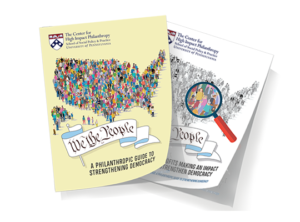 “We the People: A Philanthropic Guide for Strengthening Democracy” offers strategies for increasing civil engagement, shoring up local media, and improving government.
“We the People: A Philanthropic Guide for Strengthening Democracy” offers strategies for increasing civil engagement, shoring up local media, and improving government.
New applied research from the Center for High Impact Philanthropy (CHIP) looks at how donors can give their money to strengthen democracy, reversing decades-long trends that have eroded civic engagement, civility, and cooperation and seeded hyper partisanship. Published in two parts, “We the People” establishes a framework donors can use to boost democracy and identifies nonprofits making an impact.
Since 2006, the Center for High Impact Philanthropy at Penn’s School of Social Policy & Practice has enabled donors worldwide to make a meaningful difference in the lives of others. Now, funded by a grant from Democracy Fund, CHIP has applied its analysis to a pressing need to strengthen democracy in the United States.
CHIP’s Framework for Strengthening Democracy
Multiple surveys over the past decade have revealed a trend of declining confidence in democracy among Americans. In a 2018 survey jointly commissioned by Freedom House, the Penn Biden Center, and the George W. Bush Institute, a majority of respondents (55%) characterized American democracy as “weak,” with 68% percent saying it is “getting weaker.”
While many factors contribute to this growing sense that democracy is weakening, there are practical and thoughtful efforts underway to reverse these sentiments. The Center for High Impact Philanthropy’s “We the People: A Philanthropic Guide to Strengthening Democracy” creates a framework for anyone looking to strengthen the democratic system.
The framework identifies five core dimensions—empowered citizens, fair processes, responsive policy, information and communication, and social cohesion—that are essential to shoring up democracy. Focusing on these five elements can help donors understand what types of efforts to fund to achieve their impact goals.
CHIP provides a deep dive into two high-impact examples of how the framework can be applied: increasing civic engagement and reinvigorating local media. To assist donors who are ready to act immediately, CHIP has published a supplement, “We the People: Nonprofits Making an Impact for Democracy,” highlighting eight initiatives and organizations that are strengthening democracy through civic engagement and local media.
Why Donors Should Care About Democracy
While general elections tend to spotlight highly partisan politics, a democracy is more than elections. It’s all the institutions that vest power in citizens, including free press, rule of law, individual rights, and others.
The most obvious reason for philanthropy to care about our democracy is that its shortcomings are no longer abstract. This year’s record-long government shutdown was only the latest example of a decades-long decline in our political system’s ability to take timely action on pressing public issues. While the disproportionate influence of wealthy donors in politics undermines the democratic principle of “one person, one vote,” philanthropy represents the collective efforts of citizens coming together to solve common problems, the essence of democratic culture.
About the Center for High Impact Philanthropy
The Center for High Impact Philanthropy (CHIP) is the only university-based center with a singular focus on philanthropy for social impact. Founded as a collaboration between the School of Social Policy & Practice and alumni of the Wharton School, it is a trusted source of knowledge and education to help donors around the world do more good. To learn more about how CHIP analyzes opportunities for high social impact, visit www.impact.upenn.edu or follow @impactSP2.
About Democracy Fund
Democracy Fund is a bipartisan foundation created by eBay founder and philanthropist Pierre Omidyar to help ensure that our political system can withstand new challenges and deliver on its promise to the American people. Since 2011, Democracy Fund has invested more than $100 million in support of a healthy democracy, including modern elections, effective governance, and a vibrant public square. To learn more, visit www.democracyfund.org or follow @democracyfund.
